#Self-Employed Persons Program
Explore tagged Tumblr posts
Text
How to Immigrate to Canada as a Self-Employed Professional
Canada offers various immigration pathways, including one specifically designed for self-employed individuals in cultural, artistic, or athletic fields. The Self-Employed Persons Program allows individuals to immigrate to Canada based on their ability to contribute economically and culturally to the country. Here’s a step-by-step guide on how to immigrate to Canada as a self-employed…
#Canada cultural immigration#Canada self-employed immigration#immigration pathways Canada 2025#permanent residency Canada self-employed#Self-Employed Persons Program
0 notes
Text

Self-Employed Persons Program Canada: A Pathway to Permanent Residency
Canada's Self-Employed Persons Program is an attractive immigration pathway for those able to create their own employment, particularly in cultural, artistic, or athletic fields. This program supports self-employment, fostering economic growth and enriching Canada's cultural landscape.
Visit Website now: https://ingressimmigration.com/self-employed/
0 notes
Text
Musk steals a billion dollars from low-income Americans and sends it to Intuit

I'm about to leave for a 20+ city book tour for my new novel PICKS AND SHOVELS. Catch me on Feb 14 in BOSTON for FREE at BOSKONE , and on Feb 15 for a virtual event with YANIS VAROUFAKIS. More tour dates here.

Let me tell you about the most wasteful US federal government spending I know about. It's a humdinger. You and everyone you know are mired in it for weeks, or perhaps months, every year. It will cost you, personally, thousands of dollars over your lifetime. I'm talking about filing your taxes.
Not paying your taxes. Paying your taxes is fine. It keeps the country running, though not because the government needs our "tax dollars" to pay for things. The government annihilates the money it taxes away from us, and creates new money to pay for programs. The USA needs US citizens' dollars to build highways the same way Starbucks needs its Starbucks gift cards to make lattes – that is, not at all:
https://theglobepost.com/2019/03/28/stephanie-kelton-mmt/
I'm talking about filing your taxes. In nearly every case, a tax return contains a bunch of things the IRS already knows: how much interest your bank paid you, how much your employer paid you, how many kids you have, etc etc. Nearly everyone who pays a tax-prep place or website to file their tax return is just sending data to the IRS that the IRS already has. This is insanely wasteful.
In most other "advanced" countries (and in plenty of poorer countries, too), the tax authority fills in your tax return for you and mails it to you at tax-time. If it looks good to you, you just sign the bottom and send it back. If there are mistakes, you can correct them. You can also just drop it in the shredder and hire an accountant to do your taxes for you, if, for example, you run a small business, or are self-employed, or have other complex tax needs. A tiny minority of tax filers fall into that bucket, and they keep the tax-prep industry in other countries alive, albeit in a much smaller form than in the USA.
In the US, we have a duopoly of two gigantic tax-prep outfits: H&R Block, and Intuit, owners of Turbotax. These companies make billions from low-income, working Americans every year, charging them to format a bunch of information the IRS already has, and then sending it to the IRS on their behalf. These companies lobbied like crazy for the right to tax you when you pay your taxes.
In 2003, it looked like the IRS would start sending Americans pre-completed returns, so H&R Block and Turbotax went into lobbying overdrive, whipping up a "public private partnership" called the "Free File Alliance," that promised to do free tax prep for most Americans. But once the threat of IRS free filing was killed, they turned Free File into a sick joke. Americans who tried to use Free File were fraudulently channeled into filing products that cost money – sometimes hundreds of dollars – to use, a fact that was only revealed after the taxpayer had spent hours keying in their information. Free File sites were also used to peddle unrelated financial products to tax filers, with deceptive language that implied that buying these services was needed to file your return:
https://www.propublica.org/article/inside-turbotax-20-year-fight-to-stop-americans-from-filing-their-taxes-for-free
The big winner from the Free File scam was Intuit, which bought Turbotax in 1993. They made about one billion dollars per year ripping off Americans they'd promised to file free tax returns for. After outstanding work by Propublica, lawmakers and the IRS were finally pressured to create an IRS-based free filing service that would cut Intuit out of the loop. Intuit went on a lobbying blitz without parallel, giving out $3.5m in bribes in 2022 in a bid to kill the Treasury Department's study of a free filing service:
https://pluralistic.net/2023/02/20/turbotaxed/#counter-intuit
In 2022, nearly every US state attorney general settled their lawsuits against Intuit for the Turbotax ripoff, bringing in $141m:
https://www.agturbotaxsettlement.com/Home/portalid/0
In 2023, the FTC won a case against Intuit over the scam:
https://www.ftc.gov/business-guidance/blog/2023/09/nine-takeaways-initial-decision-intuit-turbotax-action
But Intut was undeterred. They came back in 2023 with a campaign to say that ripping off American tax-filers was antiracist and anyone who wanted the IRS to make filing free was, therefore, a racist:
https://pluralistic.net/2023/09/27/predatory-inclusion/#equal-opportunity-scammers
Strangely, no one bought that one. By May, 2023 the IRS had announced its own, in-house free file program:
https://pluralistic.net/2023/05/17/free-as-in-freefile/#tell-me-something-i-dont-know
Now, no one is forcing you to use this program. Do you have a family accountant that your grandparents started using in the Eisenhower administration? Just keep going to them. Do you like using Turbotax? Keep using it! Wanna do your own taxes? Here's the forms:
https://www.irs.gov/pub/irs-pdf/f1040s.pdf
But if you want to file your taxes for free, and you earn $125,000/year or less, here's the IRS's service:
https://www.irs.gov/filing/irs-direct-file-for-free
Better use it quick, though. Elon Musk has just announced that he's killing it. Yeah, I know, no one elected him. That doesn't seem to matter to anyone, least of all Democrats on the Hill, who are still showing up for work every day and trying to engender a "spirit of comity" rather than screaming and throwing eggs:
https://apnews.com/article/irs-direct-file-musk-18f-6a4dc35a92f9f29c310721af53f58b16
Musk called IRS free file a "far left" program and announced that he had "deleted it." By the way, the median Trump voter's income is about $72k, meaning more than half of Trump voters qualified for free file:
https://fivethirtyeight.com/features/the-mythology-of-trumps-working-class-support/
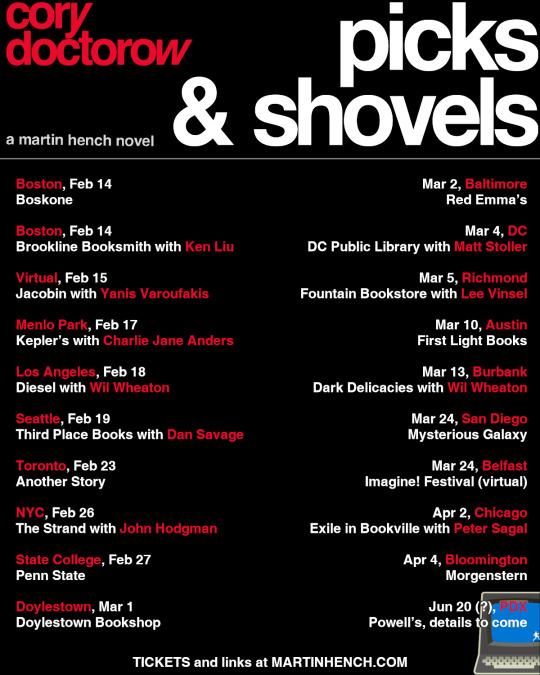
If you'd like an essay-formatted version of this post to read or share, here's a link to it on pluralistic.net, my surveillance-free, ad-free, tracker-free blog:
https://pluralistic.net/2025/02/11/doubling-up-on-paperwork/#rip-freefile

Image: Wcamp9 (modified) https://commons.wikimedia.org/wiki/File:Elon_Musk_-_March_28,_2024_%28cropped%29.jpg
CC BY 4.0 https://creativecommons.org/licenses/by/4.0/deed.en
574 notes
·
View notes
Text
homeless disabled trans person needs help paying for hotel, storage unit & phone while government assistance housing program keeps delaying their move in date
March 21st, 3/21/2024: hello, I'm equinox or Johnny, I'm a severely multiply disabled trans person living in a hotel right now due to not being able to afford apartments on the housing market right now. i have a guaranteed apartment through a government assistance program, but their compliance team keeps delaying my move in date because they cannot figure out how to calculate my earned income because i am self employed. they have been running me in circles asking for the exact same information for six months and have been becoming increasingly more condescending and rude as I've pointed out that they're asking for information i physically cannot provide, like "bank statements" for GoFundMe, a fundraiser website that considers all money earned personal gifts, and tumblr bank statements.
i haven't been able to get my hormones in weeks.
i was promised to move into my apartment on the 7th, then the 11th of this month, and it was requested of me to put the electricity bill in my name so I could get moved in as soon as possible. I did this and now i have a $20 electric bill in my name because they've delayed for so long. my unit has been sitting empty for 6 months and now I'm expected to pay for the electricity that is running in a 1 bedroom apartment I'm not living in.
i have been homeless for 6 months straight. i have been living in my hotel for 2 months. my hotel has been without WiFi for a month which forced me to get a Tracfone with a data plan so I can do my job and communicate with this apartment complex via email. i unfortunately need to buy more data because this has taken so long. most of my possessions including large portions of my stock and shipping supplies are in my storage unit, of which the $78 bill is due in 3 days.
the hotel I'm staying at is normally $40/night but the prices are skyrocketing this weekend because this is a very cheap hotel due to its low rates. i can't afford any of these nights independently of each other, let alone altogether, and it's Thursday and i haven't heard a single word about my move in date.
i have been depressed and crying for days, i cracked a tooth from clenching my teeth and i haven't been sleeping due to stress and nightmares. anything helps. thank you for taking the time to read and support and share. everyone has kept me housed for 2 months so far. i owe you all so much
PayP al: [email protected]
cash app: $glitterGraphix
venmo: @ Equinoxian
chime: @ Equinoxian



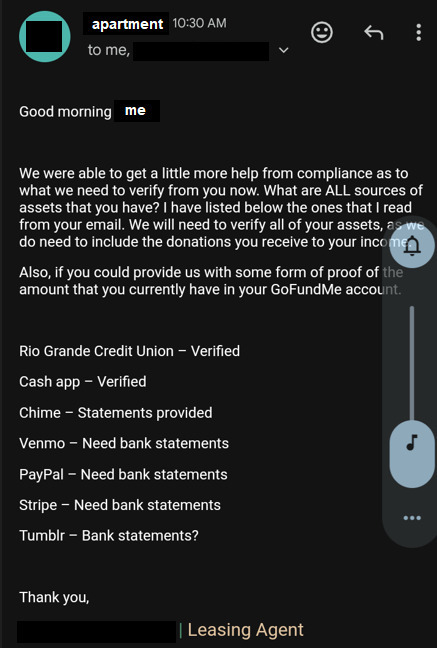

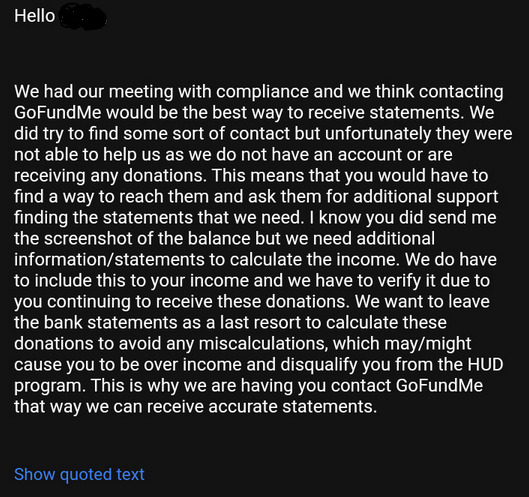
#trans#transgender#lgbtqia#lgbtq#lgbt#mutual aid#trans mutual aid#share your dollar#queer mutual aid#disabled mutual aid#queer crowdfund#disabled crowdfund#trans crowdfund#lesbian#transmasc#transmasculine#gay#bisexual#ftm#trans man#trans men#trans woman#trans women#trans girl#intersex#genderfluid#genderqueer#butch lesbian#nonbinary#non binary
1K notes
·
View notes
Text
i got so lucky with my "gifted programs" they just did shit like take us to the opera dress rehearsals and show us Culture that i guess they figured the normal dumb children couldnt appreciate. the american school system is a farce from top to bottom. in high school my grades were finally so bad i was in remedial everything and in danger of failing out for just not turning homework in ever, and as a result taking half my classes in a portable classroom trailer park for pregnant girls and kids who just got out of prison, but at the same time i was also still in the "gifted program" in the hand-picked "Rhetoric" class taught by a local octagenarian Rotarian volunteer who was a successful heart surgeon who would personally tutor us in Socratic round tables in subjects that ranged from extremely, extraordinarily stupid (Give a Mouse a Cookie, Dean Koontz novels??, enneagrams and myers-briggs?????) to very useful and literate (shakespeare, world class opera, speed reading, greek and latin, phonetics).
i should have dropped out in 7th grade and taken the GED and i recommend every kid whos thinking about doing that to just do it. especially if you are, as i was, already self-employed. i was selling illustrations to publications like TTRPGs, and doing flyers for shows in my town and the cities around it, and selling some work out of a local gallery. and i was in 2-3 theater shows a year anyway on top of everything else. so like if youre already at that point just drop out and take the GED, high school is the biggest waste of time and its the biggest regret of my life that i stuck it out until i graduated (late, because i was missing fucking PE credits).
you can seriously get so far ahead of everyone else in your career path if you arent doing your fucking high school homework. you can start a career 5-10 years before everyone else does by doing this. the usa high school is largely a way to artificially keep labor competition out of the job market for longer when realistically any 16 year old is in their prime learning stage and is fully capable of doing plenty of specialized work
and dont go to art college lol get an HVAC, plumbing, cosmetology, solar installation or whatever certification you can use when your self-employment doesnt come through
92 notes
·
View notes
Text
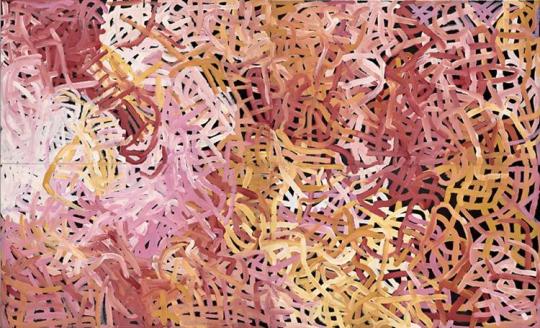




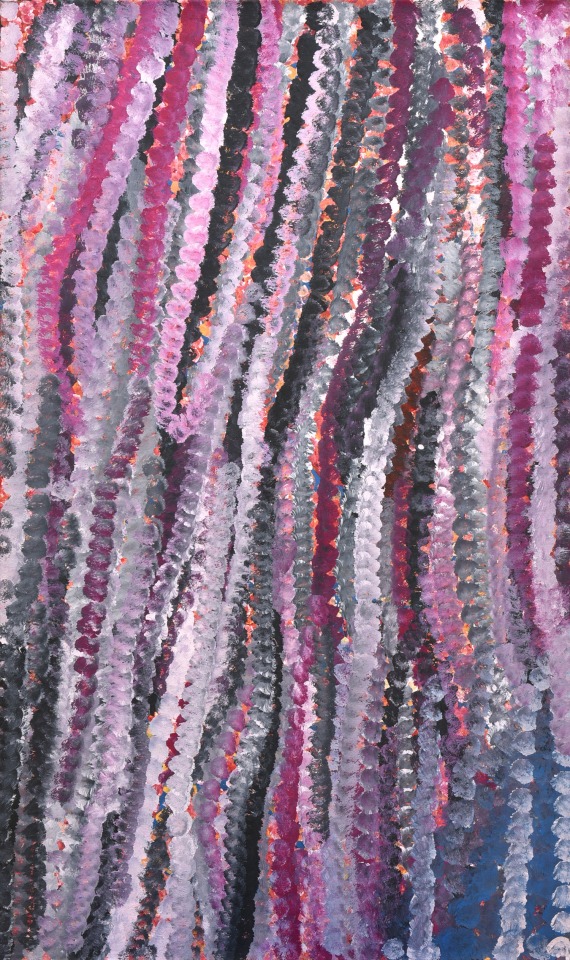
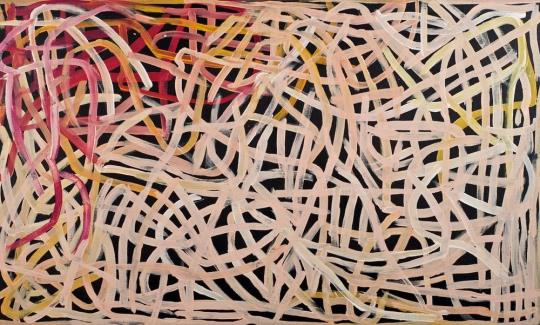
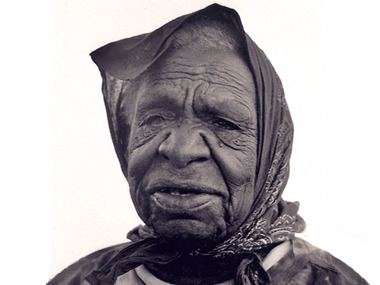

Emily Kame Kngwarreye (1910 – 1996) is considered one of Australias most significant artists. Amazingly, she only began painting with acrylics in her late seventies but in a few short years became an artist of national and international standing.
Emily was the first female painter to emerge from an art movement dominated by men and did so in a way that transformed Aboriginal painting. Employing a variety of styles over the course of her eight-year painting career, she painted her Country and sacred Dreamtime stories in a deeply emotional and expressive manner.
She was born around 1910 at Alhalkere (Soakage Bore), on the edge of the Utopia pastoral station, approximately 250km north-east of Alice Springs. Alhalkere was her fathers Country, and her mothers Country was Alhalpere, just to the east.
Despite being married twice, she had no children of her own but raised her relative Lily Sandover Kngwarreye and her niece Barbara Weir. Both becoming famous artists in their own right. Other nieces that also became famous artists include Gloria Petyarre, Kathleen Petyarre, Ada Bird Petyarre, Violet Petyarre and Nancy Petyarre.
Well before she became one of its most senior contemporary artists, Emily held a unique status within her community of Utopia. Her strong personality and past employment as a stock hand on pastoral properties in the area (at a time when women were only employed for domestic duties), reveals her forceful independence and trailblazing character.
Her age and ceremonial status also made her a senior member of the Anmatyerre language group. She was a senior custodian of cultural sites of her fathers country. She was considered the Boss Woman of the Alatyeye (pencil yam dreaming) and Kame (yam seed dreaming).
Emily started as a traditional ceremonial artist, beginning painting as a young woman as part of her cultural education. An important component of this education was learning the womens ceremonies, which are associated with in-depth knowledge of the Dreamtime stories and of womens social structures.
This knowledge is known as Awelye in Anmatyerre language. Awelye also refers to the intricate designs and symbols associated with womens rituals. These are applied to the womens upper chest, breasts and arms using fingers or brushes dipped into rich desert ochres.
Aboriginal art outside of ceremonial painting began in Utopia in 1977, when batik-making was introduced to women as part of an extended government-funded education program. In 1978, Emily was a founding member of the Utopia Womens Batik Group. In 1988, the Central Australian Aboriginal Media Association (CAAMA) completed its first project with the Utopia Womens Batik Group. This became an exhibition called Utopia - A Picture Story.
From the beginning, Emilys art stood out from the others. Rather than filling her batiks with Aboriginal symbols, she preferred patterns of layered lines and dots that revealed plant, figurative forms and cell like structures. The 88 silk batiks from this first project were acquired by the Holmes a Court Collection in Perth.
In the same year the CAAMA shop initiated The Summer Project, introducing the Utopia womens batik group to the use of acrylic paints on canvas. Among the 81 paintings completed was Emilys first artwork on canvas, Emu Woman.
Inspired by the many Dreamtime stories of which she was a custodian, Emily employed an extraordinary array of styles over the course of her eight-year painting career.
In her early works, Emily preferred the use of an earthy ochre colour palette, reflecting her experience of using natural ochres during ceremonies. Over time she expanded her repertoire to include a dazzling array of colours found in the desert landscape. Colours are significant in her paintings. Yellow, for example, often symbolises the season when the desert earth begins to dry up and the Kame (yam seeds) are ripe.
Her shifting styles also reveal her self-confidence and willingness to experiment with form, pictorial space and artistic conventions. She drew creatively from the geographic landmarks that traverse her Country and the Dreaming stories that define it. Whenever she was asked to explain her paintings, her answer was always the same:
Whole lot, that's the whole lot. Awelye (my Dreamings), Alatyeye (pencil yam), Arkerrthe (mountain devil lizard), Ntange (grass seed), Tingu (a Dreamtime pup), Ankerre (emu), Intekwe (a favorite food of emus, a small plant), Atnwerle (green bean), and Kame (yam seed). That's what I paint; the whole lot.
This is because she chose to present a very broad picture of the land and how it supports the Anmatyerre way of life. Her artworks embrace the whole life story of the Dreamtime, seeds, flowers, wind, sand and everything. Although her works relate to the modern art tradition, this resemblance is purely visual. The emphasis in Emilys paintings is on the spiritual meaning, based in the tradition of her people.
The evolving styles of Emily Kame Kngwarreyes paintings
Emily started to paint in 1988. Her early style featured visible linear tracings following the tracks of the Kame (Yam Dreaming) and animal prints associated with the Emu Dreaming. Fields of fine dots partially obscured symbolic elements.
By 1992 her paintings were so densely packed with layers of dots that her symbolic underpainting was no longer visible.
Another evolution in her painting style occurred when she began to use large brushes. She worked faster, more loosely and on a larger scale. Sometimes dragging the brush while she dotted, producing lines from the sequential dots.
By the mid 1990s she had pioneered a style of Aboriginal painting referred to as dub dub works. They were created by using large brushes which were laden with paint and then pushed into the canvas in such a way that the bristles part and the paint is mixed on the canvas.
Using this technique, she created wildly colourful artworks and her paintings became progressively more abstract. Different artists from Utopia including Polly Ngale and Freddy Purla have subsequently adopted this style.
During the last two years of her life, she used the linear patterns found on womens ceremonial body designs as the primary inspiration for her paintings. The abstracted sequential dots of colour gave way to parallel lines which were much more formally arranged. She had used lines earlier before gradually submerging them under layers of dots. This time, she created simple, bold compositions of parallel lines in strong dark colours.
The above style in turn evolved to looser meandering lines which appear to trace the shapes of the grasses and the roots of the pencil yam as they forge their way through the desert sands.
In 1996 she produced a body of work in which she depicted pencil yam dreaming using a rich ochre colour palette. In this final burst of creative energy, Emily produced a beautiful body of work known as her scribble phase. In these atmospheric paintings, lines and dots were replaced by flowing fields of colour.
https://www.kateowengallery.com/.../Emily-Kame-Kngwarreye...
218 notes
·
View notes
Text
The Paranormal Paths Legacy Challenge
By SilverPhoenix42 aka me & @streetrabbit42
Needed Packs: EP: Life & Death, Island Living, Discover University, Lovestruck, Seasons, Eco Lifestyle, City Living (OPTIONAL) GP: Realm of Magic, Werewolves, Vampires, Outdoor Retreat SP: Paranormal Optional Mods: MC Command Center, Spinning Plumbob’s Expanded Plantsims, Spinning Plumbob’s Expanded Mermaids

Generation 1: Human
As an average hopeless romantic, you are searching for that one special person. The one who will make the relationship feel magical. As it turns out, that person is not human.
Aspiration: Soulmate OR Romantic Explorer
Traits: Romantic, Outgoing, [Your Choice]
Max Skills: Romance, Charisma
Career: Romance Consultant
Rules:
Marry a spellcaster
Have at least 1 child

Generation 2: Spellcaster
Your parents met and fell in love, and with how perfect they seem together, you thought you’d never find that for yourself. Well, you didn’t. But you found someone truly out-of-this-world.
Aspiration: Spellcraft & Sorcery OR Purveyor of Potions
Traits: Bookworm, Goofball, [Your Choice]
Max Skills: Herbalism, Logic
Career: Gardener - Botanist Branch OR Education - Professor Branch
Rules:
Must meet and have a baby with an alien
Must have 1 at least somewhat-alien child

Generation 3: Alien
Your parents weren’t quite the picture-perfect romance, but you had your dog. Your new partner gets along great with your furry friend!
Aspiration: Renaissance Sim OR Academic
Traits: Clumsy, Geek, [Your Choice]
Max Skills: Handiness, Logic
Career: Freelance Programmer OR Business - Either Branch
Rules:
Must marry a werewolf
Must have at least 1 werewolf child
Must adopt a dog and have one when they meet their spouse

Generation 4: Werewolf
Growing up you always loved bathtime, and it seems your partner does, too. For different reasons.
Aspiration: Emissary of the Collective OR Wildfang Renegade
Traits: Self-Assured, Outgoing, [Your Choice]
Max Skills: Charisma, Fitness
Career: Politician - Either Branch OR Criminal - Either Branch (Respectively depending on the aspiration you choose)
Rules:
Date or Marry a Mermaid
Have at least 1 mermaid child

Generation 5: Mermaid
Your romance isn’t as fantastical as your parents’ are, but it’s good enough. You were more like best friends than lovers. That’s why it didn’t quite work out.
Aspiration: Beach Life
Traits: Bro, Loves Outdoors, [Your Choice]
Max Skills: Mixology, Wellness
Career: Culinary - Mixology Branch OR Conservationist - Marine Biologist Branch
Rules:
Meet and have a child with a vampire
Break up with Vampire
Must have at least 1 vampire child

Generation 6: Vampire
You never had many relationships, but this one person was always special to you.
Aspiration: Vampire Family, Good Vampire, Master Vampire (Your Choice)
Traits: Genius, Perfectionist, [Your Choice]
Max Skills: Robotics, Programming
Career: Engineer - Mechanical Engineer Branch OR Self-Employed Inventor*
Rules:
*Build stuff and sell them off however you want
(HUMAN GEN)
You can’t have relationships higher than acquaintance expect for ONE romantic relationship that they marry
Must have at least ONE child
Either your child must be born human, or you must make a vampire antidote for the child
(OPTIONAL SERVO GEN)
You can’t have relationships higher than acquaintance
Must build a Servo as your heir
(OPTIONAL PLANTSIM GEN)
You can’t have relationships higher than acquaintance, OR you may only have one romantic relationship
Adopt a child or you must make a vampire antidote for your child

Generation 7: Servo (Optional - Requires Discover University)
You were your creator’s pride and joy. They loved you like their child, so you wanted to spread that love.
Aspiration: Serial Romantic OR Paragon Partner
Traits: Lovebug, Neat, [Your Choice]
Max Skills: Robotics, Programming AND/OR a musical skill
Career: Business - Either Branch OR Tech Guru - Either Branch
Rules:
Adopt a child or (if you have to partners of the opposite sex) those two can have a child
Depending on the Aspiration: If Serial Romantic, they can only date. If Paragon Partner, You have to marry one of your partners, but have at least two partners live with you
(PLANTSIM GEN)
Max out the Gardening skill, obtain the magic beans, and get the Fruit of the Plantsim for your child
If you chose Paragon Partner aspiration, one of the partners can take on the gardening challenge
Or cheat, I do not care if you choose to make your life easier.
(HUMAN GEN)
No specific Rules

Generation 8: Plant Sim (Optional)
Your parent(s) always cared for you deeply, doing whatever they could to help you reach your dreams. You wanted to give a child as many opportunities as you had.
Aspiration: Eco Innovator
Traits: Vegetarian, Loyal, [Your Choice]
Max Skills: Gardening, Fishing
Career: Civil Designer - Either Branch OR Gardener - Botanist Branch
Rules:
Marry a Human
Have or Adopt a Human Child

Generation 9: Human
Your parent(s) were always very generous and attentive, but also quite lax, so you could do just about whatever you wanted. You made some interesting choices with your life, and look where it got you.
Aspiration: You Choose
Traits: Chased by Death, [Your Choice], [Your Choice]
Max Skills: Medium and Piano OR Pipe Organ OR Violin
Career: Achieve level 6 of any career
Rules:
Can NOT complete their bucket list
Can only complete up to 2 bucket list objectives before you die
Die as a Young Adult (you can choose how they die)
Either complete your aspiration before dying, or give up on it after death

Generation 10: Ghost
You got to do almost everything you wanted with your life. But there was plenty that was left unfinished. Now as a ghost, you can do more than you could in life, and want to use it to your full advantage.
Aspiration: Ghost Historian
Max Skills: Thanatology, Mischief
Career: Unemployed
Rules:
After dying, you must complete your bucket list (all 8 items)
Play your chosen instrument in the middle of the night
Choose a spirit route and lean into it. Go full on crazy with your choice
If you’re good, be a very helpful and nice ghost
If you’re evil, making their lives hell.
When done with this gen, feel free to Reincarnate and do what-the-fuck-ever you want
If you Reincarnate, feel free to re-play through these Gens and choose the other options!
#challenges#sims 4 challenges#ts4 challenges#StreetRabbit42 challenge#SilverPhoenix42 challenge#Valkerie Challenge#ts4 challenge collab#Paranormal Paths Legacy#Paranormal Paths Legacy Challenge#legacy challenge#sims 4 legacy#ts4 legacy#sims 4 legacy challenge
101 notes
·
View notes
Note
So what is Murderbot?
I'M SO GLAD YOU ASKED
I'm probably gonna butcher it but basically, The Murderbot Diaries follows the misadventures of a character known as Murderbot/SecUnit (it refers to itself as Murderbot and its human companions call it SecUnit). Murderbot (the character) is what's known as a bot-human construct (basically an android with biological components, in slightly simpler terms). "SecUnit" is short for Security Unit. Security Units are created to provide security/protection for the humans who employ them, and are considered by most to not be persons in their own right.
(From the Wiki) SecUnits are fitted with a governor module, which punishes them if their behavior deviates from a given set of programming and instructions. For example, if a SecUnit tries to sit down on human furniture, it's punished. If it hacks systems or searches for hacks without human direction, it's punished.
(Back to me) So at the start of the first book in The Murderbot Diaries, we're told that Murderbot has hacked its governor module and is no longer under its control. But it's pretending to be, to avoid the Consequences™ of being a rogue SecUnit.
The books are all narrated by Murderbot and we follow along as it navigates its path of self-discovery (along which it drags its feet constantly because it does not want to be considered human and is quite proud to be a SecUnit) surrounded by human companions who are mostly very supportive of Murderbot being its own person. Murderbot, while unerringly devoted to the protection of its humans, mostly wishes to be left alone so it can watch media (most especially its favorite show, The Rise and Fall of Sanctuary Moon)
I don't want to spoil too much so I'll stop my rambling here. All that to say, I can't recommend this series highly enough. I really really loved listening to the audiobook versions in particular, because Kevin R. Free is an amazing narrator.
#thank you for giving me the opportunity to ramble#i love this series SO MUCH#hopefully i didn't misrepresent anything#the murderbot diaries
18 notes
·
View notes
Text
[“Changes in the industrial base of capitalism in the 1970s only served to expand psy-professional practice still further. As the manufacturing sector was replaced in economic significance by growth in the service industries, changing skills were required within the labour force. Traditional manual labour was declining while there was a burgeoning skills gap within white collar occupations. Thus, the labour force was put under increasing pressure to “adapt” and “upskill” to meet the needs of the changing marketplace.
The new aptitudes required by employers included social skills, problem-solving skills, independent and team working, a flexible approach to work, as well as workers ready to further upskill. In the future, people would have to demonstrate high levels of “employability” within their jobs and what Elraz (2013: 810) calls a “sellable self” which will be, “associated with the constant expectation to perform, manage-impression, self-promote and ‘sell’ oneself as an attractive product: with no ‘faults’, ‘weaknesses’ or ‘limitations’, always ready to be, and do ‘more’.”
This “new subjectivity of work” (Rose 1999: 106) has meant that the individual worker has become a key site for psy-professional intervention in neoliberal society. I experienced one example of this intervention at first-hand when I was employed at a Training and Enterprise Council in England in the early 1990s. Both employees and our unemployed “clients” were offered the chance to undertake taxpayer-funded neurolinguistic programming, a business-orientated form of neurocognitive therapy. The presence of this “training initiative” is a small demonstration of the successful creep of the psychological sciences into the work environment over this period—those to be re-skilled learnt in these sessions that the way to real, long-lasting, and personally satisfying success was to examine their own weaknesses and confront their personal barriers to achieving a job. The discourse of neurolinguistic programming fitted perfectly with the dominant notions of the sellable self, where success in employment was intrinsically tied to the self-actualisation of the person; an increasing need within neoliberal capitalism to “work on the ego of the worker” (Rose 1999: 113).”]
bruce m.z. cohen, from psychiatric hegemony: a marxist theory of mental illness, 2016
31 notes
·
View notes
Text
one of my friends is a social media manager, who wants to be self employed, but she doesn't know how to use Adobe programs and doesn't do graphic design, so we thought maybe a good way to make money, self employed, is to combine our skills... we met up and talked about operating as a two person social media 'agency' where the (local) companies we plan to approach can pay us to do a certain amount of Posts per month.... but u cant convince anyone to hire u for something if u dont have something u can show them, so in the next month i'll be producing like, 9 instagram posts art directed by my friend lol. i really truly trust this woman's insight and understanding of the social media game and shes well connected to possible clients, and ofc im excited just to create something - ive done a lot of print and web work but never really graphic design for social media
31 notes
·
View notes
Text
My DEI Experience
The very public cancelations of DEI programs got me thinking about my experience as the Executive Sponsor of a DEI program at a major global software company a few years ago.
There were several DEI groups (ex. LGBTQ, Pan-Asians, Blacks, etc.) and I was sponsor for the Black group. It was an enlightening experience for me and I'm proud that I helped many members secure interviews for internal positions and several were promoted.
My company's DEI program didn't have any hiring quotas, instead it was more of a networking and training opportunity for DEI members to share their experiences, learn some new skills and get exposure to sr. executives and hopefully secure the executive's support and encouragement.
As the sponsor of the DEI program, I couldn't help but acknowledge the advantages I'd enjoyed throughout my career as a tall white-guy, with similar tall white-guy professionals as family members. When graduating from Indiana University in 1989, I went to work at Price Waterhouse in St. Louis, the same office my Dad worked at when he graduated from college 25 years prior. I met all the hiring criteria (GPA, interviews etc.) and passed the CPA exam, etc. so the decision to hire me wasn't a favor to my Dad, but it certainly didn't hurt that a few of the partners knew my name and if nothing else, I didn't have imposter syndrome. My Dad had done this job and nearly everyone else doing the job looked like me as did almost everyone in sr. mgt.
My second job was with a company that employed my father-in-law. I don't think that influenced the decision to hire me, but it certainly didn't hurt. At this second company I entered the industry where I spent my career, much of it working for a guy who had attended my wedding as a guest of my in-laws. I'm confident that any of my colleagues would agree that I excelled in my various roles, but having those initial personal connections didn't hurt and there were other candidates and colleagues without the benefit of my network by birth and marriage. Through it all, I recognize that I looked like the hiring manager and the last person to have the job I was seeking.
One of the most enriching aspects of my DEI experience was gaining an understanding of how being a minority introduces an entirely new suite of uncertainties. On the rare occasion I received a less than stellar performance review or was passed over for a promotion, I never considered that my race/gender/sexual orientation might be the reason. But the conversations with my DEI colleagues confirmed that this is ALWAYS in the back of their mind, especially working for an overwhelmingly white company. Every colleague could cite examples of overt, incontrovertible racism they'd experienced (not necessarily at the company) which had made them question whether quiet racism was influencing their experience at our company. For example, was their supervisor just generally a jerk, or was the supervisor especially unpleasant to the employee because of her race, gender, etc.? If you've been on the receiving end of maltreatment, it can be difficult to be objective.
My role as the DEI sponsor was pretty straightforward. I did basic things like help critique resumes and provide interview coaching. I encouraged the candidates to overcome their imposter syndrome and apply for aspirational positions. Most importantly, I tried to be the networking resource they lacked. I sent notes and arranged brief phone calls with hiring managers to introduce the candidate. I was very careful not to inadvertently pressure the hiring manager (I know that just receiving an email from me created anxiety). I simply asked that the hiring manager/interviewer give the candidate an interview. I'm proud that my DEI group experienced above-average promotion velocity in the company.
Americans love to celebrate the 'pull yourself up by your bootstraps' story and white males especially want to believe that they are self made men. DEI programs can be challenging for guys like me because it can cause introspection which is humbling. It requires a person to acknowledge that maybe, just maybe you had some help along the way or at a minimum, you didn't face the external and internal obstacles of other candidates who may have been just as smart and capable. It is humbling to admit that at the very least, you benefitted from the fact that you looked like the last person who did the job; that's why I think white males are so intent on dismantling DEI programs.
45 notes
·
View notes
Note
In what way are phrenological principles still foundational to research psychology & neurology, and science in general? Asking out of ignorance and wanting to know more.
so, phrenology throughout the 19th century was a broad program of research principles, self-help advice, and social-hygienic prognostication. we tend to think of it now as being reducible to a craniometric chart and a crank trying to divine personality traits from a person's skull shape—this did happen, but phrenology encompassed much more than that. it was a driving force in the increasing acceptance of ideas like brain localisation (that the brain did not act as one, but had distinct parts that could behave differently and independently to one another), the related position that human psychology and personalities could be classified / taxonomised / measured (like, 'attention' as being a faculty distinct from 'judgment' or 'reason' or so forth), and the belief that organic derangements of the brain accounted for a person's individual social / economic / intellectual success, as well as social phenomena like crime, delinquency, or addiction.
by about the 1890s, the word "phrenology" had become more or less dismissed in mainstream french and british scientific circles, and it was portrayed as a pseudoscientific perversion of respectable craniometry / anthropometry. this happened for many reasons, including that british and french medicine were professionalising over the course of the 19th century and that phrenological practitioners were often unlicensed and operating more in a marginal self-help space (akin to many of today's astrologers) than in institutionally sanctioned scientific circles. additionally, after world war ii, phrenology's association with eugenics made it even more unpalatable; it was now seen to be politically dangerous even to those who had previously endorsed eugenics. the same happened to many other theories and disciplines of social-hygienic or degeneration-theory ideas.
however, the rejection of phrenology that began in the late 19th century and intensified in the late 20th has been largely superficial, and 'modern' science has never really grappled with the phrenological roots of so much neuro-deterministic and anthropomentric thinking, from psychiatry to a great deal of moralistic public health to the incredibly deeply entrenched, yet blatantly prejudicial in every way, idea that a person's appearance is indicative of their character or morality. fundamentally phrenology was a major driver in the acceptance (in many different fields) of scientific 'naturalism', a general rejection of prior christian teleological thinking and search for universally deterministic scientific laws instead. rendering mental action into the category of 'natural thing governed by natural laws' was foundational, for example, to darwin's conception of evolution and his effort to distinguish his own theory from the teleological evolutionary theory of robert chambers.
none of this is to say that scientific naturalism ought to be inherently rejected, or replaced with christian metaphysics; however, failing to grapple with the fuller legacy of phrenology, and eugenics more generally, because we don't want to upset what philosophical boundaries we think we've erected between religion and 'modern' science allows such eugenic thinking to retain its centrality in current scientific practice.
it is also always worth emphasising that phrenology, like a lot of scientific theories of self-improvement, has frequently been employed as a vehicle of liberal ideology, particularly in britain. although phrenological practitioners have at various times tried to ally themselves with a superficially radical sort of 'common man's' rejection of the élite scientific institutions, phrenology has at the same time followed a general trajectory whereby it emphasises more and more an idea of personal responsibility for one's own neuro-biological traits and associated character flaws. this is often seen as more palatable than outright hereditarian thinking because, rather than tacitly endorsing the expurgation of the biologically 'unfit', the liberal phrenologist affirms that people simply need to overcome, tame, or temper their own neurobiological defects in order to live productive, socially desirable lives. cf. 'negative' versus 'positive' eugenics.
if you're interested in this i would recommend roger cooter's 'the cultural meaning of popular science: phrenology and the organisation of consent in 19th-century britain' (1984) and philip rehbock's 'the philosophical naturalists: themes in early 19th-century british biology' (1983). cooter was an avowed marxist and his account of phrenology, science, and their relationships to industrial capitalism—while not flawless—is markedly different from any other prior literature on the topic. rehbock's book is less politically daring and less focussed on phrenology specifically, but clarifies some aspects of scientific naturalism and what is meant by distinguishing a 'modern' scientific episteme from earlier practices and principles.
158 notes
·
View notes
Text
AEW Feels Like a 90's Sitcom (And Why That's A Good Thing)
There's been something bugging me about "All Elite Wrestling" lately.
For weeks now, there's been a certain nostalgia to the twice-a-week program that I just haven't been able to place.
It's a living, breathing anecdote to good old 90's nostalgia.

The Ensemble Cast & Formula:
Sitcoms rely on a diverse cast of characters to strike a balance and keep people coming back every week. Amidst the brand's high-octane matches and fiery promos, its structure and storytelling truly revive what I loved about 90's television.
Each member of its expansive roster have such distinct personalities that at times, I wish we'd see more of. Nonetheless, AEW captures a close - if not the exact formula of "alternative media."
A hallmark of 90’s sitcoms was their ability to tell self-contained stories while also weaving in larger arcs. The 'All Elite' employ a similar approach. They tie in broader narratives with an oddly .. complex 'comedy gold' that we look forward to every week.

The Roster & Their Sitcom Counterparts:
It's easy to see how AEW's larger than life stars are worthy of their own "90's intro parody". Think as if "Too Many Cooks" & "Full House" had their own twisted and dysfunctional reboot.
As much as I'd love to analyze the entire roster, I'm not that insane.
youtube

1.) Maxwell Jacob Friedman (MJF) & Frasier Crane.

Frasier Crane and MJF are performers who thrive on attention and validation. Undoubtedly, two sides to the exact same coin.

(Years on TV: 1993-2004)
Similar Traits:
A taste for theatrics: While Frasier Crane's life is filled with his own dramatic blunders - MJF shamelessly brings the drama with him wherever he goes.
Overconfidence: Both men radiate a bold self-assurance. They each have a knack for flaunting their intellectual prowess. Utilizing more than a touch of arrogance along the way.
Self Absorption: MJF's famous line, "I am better than you in every single way, and you know it," is self explanatory. Frasier's ego is rooted in culture, but they both take pride in setting impossible standards.
At the end of the day;
Frasier Crane and MJF are showmen who crave the spotlight. They wield their sharp humor, charm, and over-sized egos in fancy suits.
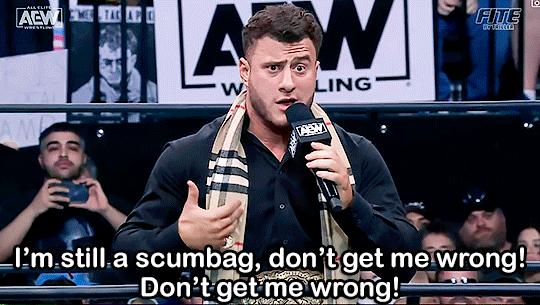

2.) Harley Cameron & Kimmy Gibbler


(Years on TV/Pre-reboot: 1987-1995)
Main. Character. Energy.
I know that they're seen as 'secondary characters', BUT they are far from it. Both of their antics are pivotal for comedic relief but beautifully displays their strengths.
Similar Traits:
Unapologetically Quirky: Whilst they may seem unconventional or out-of-place, without their humor the main plot would be much more dull.
Confident: This is the cornerstone of why I believe this comparison fits. They are unshakably self-assured. Never failing to speak their minds and express themselves in oddball ways. While unconventional, there's never a staleness and always a level of unpredictability.
Thrive Under The Spotlight: Often inserting themselves into conversations or situations, Harley and Kimmy immediately take center stage. No matter how brief it may seem.
These two gals are important to the equation.
They bring a natural enhancement- like salt to sweet, to the dynamics of those they’re on screen with.
youtube

3.) The Learning Tree (Jericho, Bill & Keith) & The Simpson's bully squad (Jimbo, Dolph & Kearney.)
youtube
Same energy:
youtube
Hierarchy, plain and simple.
Both of these trios are notorious shit starters and troublemakers.
Similar Traits:
Unconventional Leadership: Let's be honest, in their own ways both Jericho and Jimbo pull the strings in their own ways. With an aura of cartoonish coolness and love of immaturity? The shoe indeed fits. Jericho’s mentorship of Big Bill and Bryan Keith? Strangely mirrors Jimbo’s informal guidance of Dolph and Kearney. AEW is by all means their proverbial 'playground'.
The Enforcer: Big Bill and Kearney take their places on the field solely as 'the muscle' here. They both step in to reinforce the groups utter intimidation and sheer dominance. Not a thought goes on behind their eyes though, honestly.
The Rising Star: Bryan Keith and Dolph are both the mostly silent yet hungry types in their respective groups. Under their mentorships, they have the most to prove but show equal promise. These two bring a well rounded energy needed to complete their units. The groups arguably wouldn't be the same without them.
The dynamics are eerily striking once you put them under a microscope.


Well, that was a journey. Huh?
I could honestly make this idea an entire series. It was difficult enough to narrow down the list to cover.
I'd definitely want to hear YOUR thoughts on these comparisons.
#aew on max#aew collision#aew rampage#aew dynamite#aew#all elite wrestling#chris jericho#mjf#maxwell jacob friedman#big bill#bryan keith#harley cameron#wrestling blog#professional wrestling#pro wrestling#90's nostalgia#90's#sitcoms#indie wrestling#wrestling#full house#frasier#the simpsons#Youtube
19 notes
·
View notes
Text
End of the Line
Anakin Skywalker x Reader

Masterlist - Join My Taglist!
Written for my personal fic writing challenge for 2024, Sophie's Year of Fic! Featuring a new fic being posted every Friday, all year long :)
Fandom: Star Wars
Summary: Anakin and his SO have a chaotic date night - and really, when dating Anakin, what other kind could there be?
Word Count: 1,051
Category: Fluff, Humor
Putting work into an AI program without permission is illegal. You do not have my permission. Do not do it.
A beam of light whizzed over my head from where I hunkered behind cover, almost nailing me right in the forehead. I grit my teeth and readied my weapon. That marked my opponent's tenth shot, meaning he'd need to let his gun recharge before he could fire again. Time to make my move.
"Alright, that's it! Your bloodline ends here!" I shouted at the top of my lungs before popping up from my cover behind the couch. I saw a flash of shaggy brown hair as my boyfriend, Anakin Skywalker, scrambled for cover of his own across the living room.
I raised my light gun—a blaster that literally just fired light, usually used by children for tag games but tonight employed by Anakin and I—and raced across the room after him.
I fired the entire time I ran, keeping Anakin from popping up his head. It left me with just one shot by the time I got to him, but one shot was all I needed.
I rounded the corner of my favorite cushy chair and fired at my boyfriend, right on target to hit him square in the chest. That is, until my light beam stopped in mid-air.
My eyes darted up to Anakin's to find him grinning, one hand extended the way he did sometimes to use the Force and the other still holding his newly-recharged blaster. I narrowed my eyes, but before I could say anything, he fired a shot of his own that hit me in the chest.
"You cheater!" I yelled, ignoring the explosion of light still glowing against my shirt. Anakin rolled to the side and dropped his hand, letting what would've been the perfect shot streak past him and into the far wall of our apartment. I scowled.
"You never said no Force," Anakin replied, getting to his feet with an entirely too satisfied smirk. He offered a hand to me, but I didn't take it.
"Mmm, I'm pretty sure I specifically said 'No Jedi bullshit' right before we started this thing."
Anakin grinned at me as I got to my feet and faced him.
"Exactly. No Jedi bullshit. Lots of people have a connection to and use the Force."
I closed my eyes and took a long, deep, dramatic breath. When I opened them again, Anaking was still watching me with a self-satisfied smirk.
"You've been spending too much time with politicans, trying to sell me on a loophole like that."
"As opposed to bounty hunters?"
I snorted and rolled my eyes. "You and I both know that's not what I do."
"I know. It's just fun to watch your face scrunch up."
I reached out and hit Anakin in the chest, but my heart wasn't in it. We'd first met because I'd been at the top of my class with the GAR, before they'd switched primarily to clones, and the Jedi had needed an extra, well-trained hand on short notice. Now, I basically worked as a contractor for the Republic. I'd continued to help the Jedi regularly, especially, and I'd gotten close with many of them. But Anakin more than anyone else.
"So. Rematch?" Anakin asked, raising an eyebrow and holding his light blaster up. I smiled.
"As much fun as it would be to beat you in a No-Force rematch-" Anakin scoffed and raised an eyebrow, but I just ignored him. "-we already spend too much of our time around blasters. How about we order some of our favorite foods and find a good holo to watch?"
Anakin smiled, soft and genuine, and let the hand with his blaster fall back to his side.
"Yeah. I guess we can-"
He got cut short when I brought my hand up as fast as lightning, my recharged blaster now ready to go. I levelled it at his chest, pausing just long enough to give him a grin and register the absolute shock on his face before pulling the trigger.
A bright light exploded across Anakin's chest, making the front half of his shirt about five shades lighter. I cackled.
"Ha, now we're even! Call that a tie and let's get some pizza."
Anakin shook his head at me, but he was grinning all the same.
"You're ruthless. And that was incredibly sneaky of you."
I just gave him a wink.
"You know you love it, Skywalker. It's why you love me."
He snorted, but came close enough to wrap his arms around me and pull me into this chest, too.
"I do love you. Sneaky cheater in competition and all."
"Aww, babe."
Anakin and I shared a laugh and a smile before leaning into a soft, sweet kiss. Since he was a Jedi, we couldn't just do stuff like this whenever and wherever we wanted. Which meant I knew not to take a single moment alone with him for granted.
"So, now that my title's been defended, do you want to follow through on that pizza and some holos?" I asked.
"We could do that. Or..."
"Or?"
Anakin grinned, a familiar troublemaker spark in his eye that I loved. I grinned right back.
"Instead of holos or a rematch, we could team up to go wreak some havoic on Obi-Wan and Ahsoka. Play a few rounds absolutely destroying them, and then disappear somewhere nice together where they can't find us."
"I like the way you think, Skywalker. Do the Jedi or the Force or whatever say anything about soulmates?"
"I don't think so... Why?"
"Because I'm pretty sure you're mine. Get your blaster ready and let's go have some fun."
I started to head for the door, but Ani's strong arm around my waist pulled me quickly back into a searing kiss. I let my free hand come up to tangle in his hair and kissed him back, hard, until we were both finally forced to come up for air.
"Okay," Anakin said, slightly breathless and with a smile on his face. "Now we can go wreak some havoic."
I laughed as I took Anakin's hand, a little giddy as I pulled him towards the oor. We really made the perfect pair, to the occasional detriment of our friends, whether or not they actually knew we were a pair. Hopefully, we could get through this war together, and find our way to a happy ending on the other side.
And until then, we'd just find as many happy moments together like this as we could.
****************
Everything Taglist: @rosecentury @kmc1989
#sophie's year of fic#star wars#anakin skywalker#anakin skywalker x reader#star wars fanfiction#star wars imagine#star wars oneshot#anakin skywalker fanfiction#anakin skywalker imagine#anakin skywalker oneshot#star wars x reader#star wars the clone wars#the clone wars#jedi#the clone wars fanfiction#the clone wars oneshot#anakin skywalker fluff#the clone wars x reader#the clone wars imagine#obi wan kenobi
90 notes
·
View notes
Note
Would it be too much to ask what kind of jobs the new skeles might have since you already shared bram would be a groundskeeper at a cemetery?
Looks like I never officially did this one for Wave 2, just Wave 1 over here.
So, while we’re at it, let's do 2 and 3!
Ash (Undergloom Sans): He’s semi-unemployed, or self-employed depending on how you look at it. He busks, playing his trombone out on the street and accepting donations from anyone who feels so inclined. He likes playing music and the idea of brightening peoples’ days in the middle of their commute, so the money doesn’t really matter to him. Sometimes he picks up small gigs at local venues, mostly by word of mouth, and eventually he breaks into the tutoring scene—teaching his favorite instrument to young aspiring musicians who find the same joy in it that he does.
Yrus (Undergloom Papyrus): He works as a professor at the local community college, teaching anthropology. He’s passionate about the subject and can’t think of anything he’d rather do than share it with a classroom of humans who probably have no idea how interesting they really are. If only one student walked away from his class with a new appreciation for what humanity’s all about then he’s fulfilled—but he tends to send a lot more away with that than just one, since he’s a very popular, friendly, and accessible teacher.
Brick (Horrorfell Sans): He’s self-employed, knitting blankets at home and selling them online. He doesn’t need a job at all, between the Queen and his brother, money’s not an issue, but he’d go crazy if he didn’t have something to do all day, and nobody wants to see what he looks like when he goes crazy. He takes commissions often, but other times he just makes things according to whatever he’s feeling and what color yarn he has handy and sells to whoever feels like buying it.
King (Horrorfell Papyrus): He works as a physical therapist. He more or less taught himself to walk again after losing his leg, and a second time after getting a replacement, so he very personally understands the need that exists for people who are injured and want to get back to their normal life—but maybe lack the discipline, the knowledge, or the tools to take that journey solo. He’s hard on his patients and sadistically merciless, but his success rate in terms of mobility recovered is very high and any complaints after the fact are begrudging at worst.
Merc (Horrorswap Sans): He’s a home baker, making cakes and small pastries for a small but growing client base. He likes the freedom of getting to pursue his passions seriously and to be his own boss, set his own hours, screen his own clients, et cetera. He puts a lot of time and care into what he makes, both in terms of flavor and decoration, and finds nothing quite so satisfying as a repeat customer or a glowing review and recommendation to someone new.
Ell (Horrorswap Papyrus): Freelance programming is what he does for cash. It was something he could both learn how to do and actually do remotely, without the need for more than the bare minimum of in-person contact. He likes problem-solving, and complaining about the problem-solving, and the field is pretty much always in demand so if he’s bored of certain kinds of jobs, or sick of the person giving him the jobs, he can jump ship at any time and be a contractor someplace else.
Pitch (Horrorswapfell Sans): He’s a boxer, more amateur than pro so he doesn’t make a ton doing it, at least not consistently, but he likes fighting and draws in a decent crowd by being a bit of a spectacle (a blind skeleton in the ring) so the entertainment value is worth something. Aside from that, eventually, he fills in for his brother as a combination business partner/agent/accountant, helping him get jobs and keep clients and manage the money he makes doing so.
Nemo (Horrorswapfell Papyrus): He’s unemployed for a long while, but ultimately breaks into professional photography, with a specialty in travel photographs. He likes taking pictures and getting to see the world in the process, and it helps that it’s a family business so he and his brother have pretty much full control over what jobs he takes and for how much. He doesn’t really concern himself with the money numbers, though, he just likes filling out his portfolio with gorgeous locales all around the world.
Sunny (Gastertale Sans): He does a lot of odd jobs, all over the place, generally (things that are considered) unskilled labor—bussing tables, janitorial work, desk clerking, that kind of thing. He doesn’t like the thought of getting too stuck into any one thing and being unable to try something else out later if it doesn’t work out, and there’s something to be said for the satisfaction of being closely connected to the results of your labor. Sometime down the line he will end up sticking in one career, as a dealer for a casino, because it combines his social, charming nature with his sharp eye and quick hands, but until then he’s happy to bounce around.
Aster (Gastertale Papyrus): He’s a bookkeeper at a nondescript company. He’s organized and thorough with record-keeping and double-checking data, and he likes putting those skills to use to make sure his employer’s finances and transactions all balance out at the end of the day. Some might find it boring work and he could almost certainly qualify for a much more ‘prestigious’ job doing something else, but he’s satisfied having a job that doesn’t require all of his effort and brainpower, so he can save some of that for his personal life and private interests.
Spectr (Transcendtale Sans): He’s a nomad, a wanderer, he has no job. He’s a robot in the shape of a monster—ostensibly still a monster, even so—in a world full of humans that as yet believe monsters don’t exist, so even if he wanted a job, getting one would be logistically difficult. Luckily, he feels no special need to be gainfully employed and just spends his time wandering around and taking in the world. If he needs something, he’ll either just take it or use one of his brother’s accounts to pay for it.
PapAIrus (Transcendtale Papyrus): He’s a performer, a disc jockey who mixes, makes, and plays music to crowds at clubs, raves, and discos, anywhere he’s welcome. He takes advantage of the perception of his holographic form as an artist’s gimmick, like Daft Punk, Hatsune Miku, dead musicians projected onto stages to play posthumously… In his defense, that last one is sort of exactly what he is, except he didn’t really start making music until after he died. Still, he has fun doing it and adores the fame he’s steadily gaining as a popular, cutting-edge technology music act.
Xanth (Ascendswap Sans): He does aura readings for people. For those interested to know, he shares his perception of their colors and the flow of energy in and around them, and just generally describes the sense he gets about a person. What he does is really more of a soul read than an aura read, so a lot of the color meanings and terminology he uses contrast with the kind of readings his clients may get from humans who practice something a little bit different. Still, he’s earnest in his desire to help people understand themselves and their energies and emotions, so he gets a lot of recommendations and repeat clientele who trust he’s the real deal.
Piper (Ascendswap Papyrus): He works as an event planner, organizing gatherings, arranging vendors, booking venues, the whole nine. He has a great reputation for making things go smoothly and always seems to be able to talk out bumps and snags before they ever become a major problem. He also maintains great relationships with people in the industry and delights in having connections just about everywhere in case he needs to call on a favor to make something happen for a client. He's got the magic touch and the silver (gold) tongue that makes everything fall into place just so.
Carmine (Underfell Fruition Sans): He works as a clerk at a pawn shop. He gets to handle a lot of interesting items and assess roughly how much they’d be worth, and he’s pretty good at haggling and negotiating with people who might not agree with said assessments. Sometimes people will come in with broken stuff they wouldn’t be able to get too much for, but maybe he can cut ‘em a deal, fix it up on his own dime and if they come back for it, great—and if they don’t, his boss’ll be happy to have something that works to sell to somebody else at a markup, how ‘bout it? He does a brisk business and both sides of the counter love him.
Tank (Underfell Fruition Papyrus): He’s in construction. He’s huge, strong, takes direction well, and diligently follows rules and protocols—he’s an ideal fit for it. He likes to work hard and be able to see a job come together, knowing he had a part in it and being satisfied with the quality of his contribution. He especially likes to take every safety training and equipment certification course he can attend because he likes knowing what the rules are and being specifically told how certain procedures are run, machines operated, et cetera. He’s very likely to be apprenticed in as a foreman if not the inheritor someday of the construction business by its current owner for his work ethic and dedication, but that’ll be a long ways from now.
Vi (Swapfell Fruition Sans): He works as an independent auditor and combs through companies’ records, internal and external documentation, processes, and accounting and ensures everything is being done in accordance with industry standards. In short, he shows up, demands to see everything they have, and looks through it to see if they’ve lied, did something wrong, or lost information they weren’t supposed to. Sometimes he can do this remotely but other times he has to travel out to a physical office somewhere and sit down with a bunch of stuffed file cabinets, and he really doesn’t mind either way. He likes the work and he’s good at it—maybe because he’s good at it—and he finds it satisfying to catch the tiniest little misses and errors to demand an accounting of them.
Hunter (Swapfell Fruition Papyrus): He’s a trail maintenance worker for Ebott National Park. He walks the paths and hiking trails and makes sure they’re safe and unobstructed for visitors, as well as whatever odd jobs in the area that happen to come up—looking out for invasive species, helping with a bench install, directing lost tourists, that kinda thing. It’s not especially glamorous work but it’s pretty much exactly where he wants to be and he’s happy to do it, probably wouldn’t pick any other job in the world…except maybe to volunteer for a seasonal fire-watch position and do pretty much the exact same thing, but more isolated and with a big cool tower to sit in.
Kohl (Descendtale Sans): He works as a mortician at a local funeral home. He generally isn’t expected (read: allowed) to deal with grieving families, that’s more the funeral director’s purview, but he works behind the scenes embalming, processing, and otherwise preparing the dead for their final party and last ride home. He has a strong stomach—or rather, no stomach at all—and doesn’t get squeamish or emotional about the dead, so that works out. They also let him work nights so he has several long, quiet hours of methodically going through the routine with no (living) humans around to irritate him or vice-versa. Sounds like a good gig to him.
Bram (Descendtale Papyrus): Yes, still a groundskeeper for the cemetery and loving it. It was something he kind of fell into through his brother, when he didn’t really know what he wanted to do on the Surface, but his brother sends dead humans off to their final resting place and said final resting place was looking for someone to dig holes, mind the grass, keep everything looking neat and nice—and that’s certainly something he can do! He also works nights, being that monsters are almost entirely nocturnal these days, so he’s also an unintentional scarecrow deterrent to teenagers sneaking in late for partying or spooky dares when they see a slim, bony silhouette materialize out of the shadows with a shovel in hand, asking if they’re just visiting or thinking about moving in.…
#anonymous#headcanons#undergloom#horrorfell#horrorswap#horrorswapfell#gastertale#transcendtale#ascendswap#underfell fruition#swapfell fruition#descendtale
158 notes
·
View notes
Note
Hi! I’m considering becoming an editor but I’m not sure if it’s the right fit for me. If you don’t mind answering, what was your path like for becoming an editor, and what does the job mostly consist of for you?
Additionally, while I really do like helping other people’s work become better, I get too in my head to release a lot of my own work. Does editing require you to also be a writer most of the time, or could I get by mostly just editing?
Thanks!
Hi, anonymous friend!
These are really good questions for a potential editor to ask.
To (sort-of) answer your question, the amount of writing involved depends on the type of editing, honestly. So, first you have to decide what kind of editor you want to be.
Roughly, editing breaks down into three-to-four types: developmental/substantive, line/stylistic, copy editing, and proofreading. These terms are mixed up and interchanged ... often. Increasingly, line editing includes or incorporates copy editing, which is why I say "three-to-four."
Developmental is the big picture stuff, including manuscript critiques. Books of all kinds usually undergo some kind of developmental editing--by editorial agents, acquisitions editors, freelance developmental editors, etc. In my experience, this is also the kind of editing that requires the most writing and/or the most author/editor interaction.
Stylistic/line editing tends to be editing at the sentence level, looking at diction, structure, clarity, consistency, etc. Copy editing, on the other hand, is what many people think of when they think of editing--it's the mechanics of writing, like spelling, grammar, punctuation.
Proofreading is the rather specialized skill of editing proofs. They're the final eyes on a pre-published piece; they're looking for typos and errors rather than anything that will involve significant authorial changes because a proof page has already been "set" (as it were).
All of these kinds of editing can be applied to many different areas of communication, and the editors who perform them can be self-employed (like me) or work for an employer (i.e., as a more traditional employee). Employee editors might work in-house at a publisher (of books, magazines, academic journals, etc.), or they might have any number of editing-focused roles in business, government, education, etc. Self-employed editors may also end up working as contractors for other companies; this is pretty normal.
Many book publishers, including the Big Five, farm out a lot of their editing these days, by the way. Especially the copy editing and proofreading. So, those particular jobs are dwindling as in-house options. Publishers can pay freelancers less ... and avoid paying benefits. (#capitalism)
I will also say that, especially in jobs with anything to do with marketing or advertising, there's a lot of annoying scope creep where "copy editor" is often expected to be a copy writer, too. Again, it's a symptom of employers wanting to pay fewer people to do more jobs (and it's really annoying).
My path has mostly involved trying as many things as possible and slowly weeding out the ones I don't like. I've pretty much always been self-employed because the personal benefits (setting my own schedule, rates, deadlines) works better for me. That said, I'm Canadian (so I don't have to worry about employer-covered healthcare), and I have a partner whose salary is regular and whose benefits cover me, so I don't have some of the worries a freelancer in the US or a single-income household might have. I'm increasingly working on the development side of things because big-picture storytelling, including writing and editor/author interaction, is my jam. But I have also done a ton of line/copy editing on fiction, non-fiction, academic work, etc.
Without knowing what kind of editing you're looking to get into, it's harder for me to offer suggestions for next steps, but generally, I'd say it's important to get SOME training--whether through a school, a certificate program, or the various workshops and professional development offered by editing associations (Editors Canada, the CIEP, ACES, the EFA, ...there's an Australian one whose acronym has slipped my mind). Researching the flavor of editing you're interested in will probably offer up avenues for study, too. For example, most US publishers/authors use iterations of the Chicago Manual of Style. Most UK publishers/authors use Hart's Rules/Oxford. Academic journals/schools/students have different style guides (APA, AMA, MLA, Harvard, Vancouver). Law uses the Blue Book. It's good to have working knowledge of a few style guides--and then you have to keep up with the changes (Chicago's 18th edition is coming out this year, and I hear some significant changes are afoot--such as fully embracing the singular they!).
The tl;dr here is that yes, there are a lot of writer-editors. But there are also a lot of editors who aren't writers at all, or who have no interest in becoming writers, or who don't want their writing and editing to overlap, or who edit because they like helping people and they value clarity. At the end of the day, editing and writing are two very different hats, and you don't necessarily need to wear both.
...this is already a bit long, but if you have other questions or want me to get more specific about something, please ask!
#on editing#tara talks work#this post brought to you by abuse of etc.#someone should really have edited some of those out#etc. etc.
54 notes
·
View notes